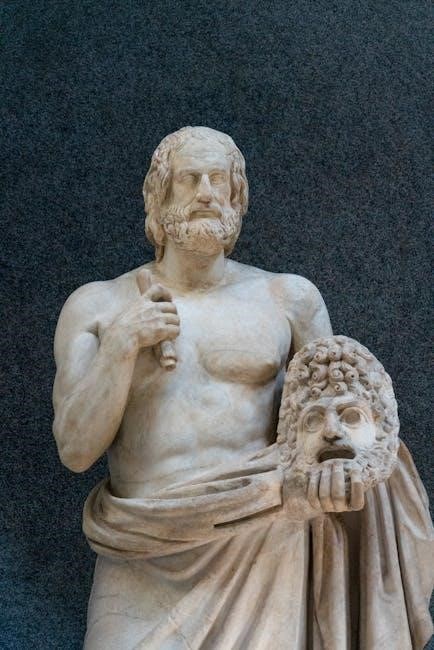Euripides’ Medea is a timeless Greek tragedy exploring themes of revenge, betrayal, and feminism. The play centers on Medea, a complex heroine, who seeks retribution against her unfaithful husband, Jason. This iconic work continues to resonate, offering profound insights into human emotion and moral conflict, making it a cornerstone of Western literature.
Overview of the Play
Euripides’ Medea is a gripping tragedy that unfolds the story of Medea, a sorceress betrayed by her husband, Jason, who abandons her for Glauce, the daughter of King Creon. The play begins with Medea’s emotional turmoil as she contemplates revenge. The nurse and tutor provide background, highlighting Medea’s suffering and Jason’s betrayal. Medea’s monologue reveals her determination to punish Jason, even if it means harming her own children. The chorus serves as a moral voice, reflecting on the devastating consequences of Medea’s actions. The play progresses through intense dialogue and emotional conflict, culminating in Medea’s horrific revenge, where she kills Glauce and her own children. The tragic ending underscores the destructive power of betrayal and revenge, leaving a haunting impact on the audience.
Significance of Medea in Greek Tragedy
Euripides’ Medea stands as a landmark in Greek tragedy, redefining the portrayal of female characters and exploring themes of revenge, betrayal, and justice. Medea’s complexity challenges traditional gender roles, presenting a powerful, intelligent heroine driven by passion and vengeance. The play’s bold exploration of human emotion and moral ambiguity set it apart, influencing Western literature’s portrayal of complex characters. Its enduring relevance lies in its universal themes, making it a cornerstone of dramatic study and a testament to Euripides’ innovative storytelling. The play’s psychological depth and moral questions continue to resonate, ensuring its timeless appeal in both academic and theatrical contexts.

Historical Context of Medea
Medea was first performed in 431 BCE, during the Golden Age of Athens. It reflects the cultural and political tensions of the time, exploring themes of justice and gender roles in ancient Greek society.
Euripides and His Influence on Greek Drama
Euripides, one of the three major tragedians of ancient Greece, revolutionized drama by introducing complex characters and emotional depth. His play Medea exemplifies his innovative approach, blending intense psychological exploration with moral ambiguity. Euripides’ works often challenged traditional norms, portraying women as multidimensional figures rather than mere victims. This departure from conventional portrayals influenced later dramatists and remains a cornerstone of Western theater. His ability to evoke empathy and provoke thought continues to inspire contemporary adaptations and reinterpretations, ensuring his legacy endures in literature and performance.
The Myth of Medea Before Euripides
Medea, a figure from Greek mythology, was known as the princess of Colchis and a powerful sorceress. Her story, rooted in ancient legends, predates Euripides’ play. In earlier accounts, Medea was often portrayed as a dangerous and mystical figure, aiding Jason in securing the Golden Fleece before their tumultuous relationship. Poets like Hesiod and Apollonius of Rhodes mentioned her in their works, emphasizing her magical abilities and tragic fate. Euripides’ adaptation reimagined her character, delving deeper into her emotional and psychological complexity, which set his version apart from earlier mythological narratives. This transformation elevated Medea from a mere mythological figure to a multidimensional tragic heroine, reshaping her legacy in Western literature.
The Original Performance and Reception

Euripides’ Medea premiered in 431 BCE at the City Dionysia festival in Athens, where it competed alongside other tragic works. The play’s innovative storytelling and bold portrayal of Medea as a complex, vengeful heroine shocked audiences. Initially, the reception was mixed, with some critics finding its themes too radical. However, its psychological depth and emotional intensity soon earned it acclaim. The play’s exploration of feminism and morality resonated deeply, establishing it as a landmark of Greek tragedy. Over time, Medea has become a cornerstone of Western literature, celebrated for its timeless themes and enduring relevance.

Main Characters in Medea
The play features Medea, the vengeful heroine; Jason, her betraying husband; the Chorus, who narrates and comments; Creon and Glauce, the royal antagonists; and Medea’s tragic children.
Medea: The Tragic Heroine
Medea, as the protagonist, embodies the essence of a tragic heroine, driven by intense emotions and a deep sense of betrayal. Her complexity lies in her dual nature—both a loving mother and a vengeful sorceress. Euripides portrays her as a powerful, intelligent woman wronged by her husband, Jason, whose betrayal sparks her relentless pursuit of retribution. Medea’s tragic flaw, or hamartia, is her overwhelming passion, which leads her to commit horrific acts. Yet, her suffering evokes pity, aligning with the Aristotelian concept of tragedy. Through her character, Euripides challenges societal norms, presenting a woman who defies patriarchal expectations, making her one of the most compelling figures in Greek drama.
Jason: The Betrayer
Jason, a Greek hero, is portrayed as a man driven by ambition and self-interest. His betrayal of Medea, his wife, is central to the play’s conflict. By abandoning Medea for Glauce, Creon’s daughter, Jason seeks political and social advancement, disregarding his vows and Medea’s sacrifices for him. His actions highlight themes of betrayal, moral decay, and the pursuit of power. Despite his heroic past, Jason’s decisions reveal a flawed character, making him the catalyst for the tragedy. His betrayal not only destroys Medea but also leads to devastating consequences for their children and the royal family, underscoring the destructive nature of his choices.
The Chorus: Role and Function
The Chorus in Medea serves as a moral voice, providing context and emotional depth. Composed of Corinthian women, they empathize with Medea’s plight, offering a collective perspective on her suffering. Through their odes, they reflect on themes like love, betrayal, and divine justice, acting as a bridge between the audience and the action. The Chorus moderates the play’s pacing, delivering choral interludes that highlight the tragic inevitability of events. Their presence adds moral commentary, humanizing Medea’s rage while underscoring the universal themes of the tragedy. This dynamic role enhances the play’s dramatic tension, making the Chorus an integral element in Euripides’ exploration of human emotion and societal norms.
Creon and Glauce: The Royal Family
In Euripides’ Medea, Creon, the King of Corinth, and his daughter Glauce represent the ruling elite who unknowingly entangle themselves in Medea’s vengeance. Creon, fearing Medea’s magical powers, banishes her to prevent potential threats to his rule. Glauce, naive and young, becomes Jason’s new bride, symbolizing the societal norms of arranged marriages. Her tragic fate, poisoned by the gifts sent by Medea, underscores the devastating consequences of Medea’s wrath. Their roles highlight the clash between personal ambition and divine retribution, making them pivotal figures in the play’s tragic unraveling.
The Children: Innocence and Tragedy
The children of Medea and Jason embody innocence and vulnerability, caught in the devastating conflict between their parents. Their tragic fate serves as a heart-wrenching symbol of the consequences of Medea’s revenge. Despite their youthful ignorance of the turmoil, they become pawns in Medea’s plan to inflict ultimate pain on Jason. Their deaths, orchestrated by their own mother, shock the audience and highlight the barbarity of her actions. The children’s innocence contrasts sharply with the brutality of the adult world, underscoring the play’s exploration of morality and the destructive nature of unchecked emotion. Their loss amplifies the tragedy, leaving a lasting impact on the audience.

Themes in Medea
Euripides’ Medea explores themes of revenge, betrayal, and feminism, delving into morality and the destructive power of love, resonating with universal human experiences deeply.
Revenge and Retribution
Revenge and retribution are central themes in Medea, driven by the titular heroine’s profound anguish and betrayal. Medea’s husband, Jason, abandons her for Glauce, daughter of King Creon, sparking her relentless pursuit of vengeance. Euripides masterfully portrays Medea’s psychological transformation from a devoted wife to a ruthless avenger, highlighting the destructive power of unchecked emotions. Her calculated revenge involves the murder of Glauce and Creon through poisoned gifts, as well as the tragic killing of her own children to deprive Jason of his legacy. This devastating cycle of retribution underscores the moral ambiguity of justice and the devastating consequences of unchecked passion. Medea’s actions challenge societal norms, raising questions about the ethics of revenge and its impact on individuals and communities.
Betrayal and Deception
Betrayal and deception are central themes in Medea, driving the plot and character motivations. Medea feels deeply betrayed by Jason’s abandonment and his decision to marry Glauce, which she perceives as a public humiliation. Her subsequent actions are fueled by a desire to punish Jason through cunning and deception. Medea’s deceptive strategies, such as offering poisoned gifts to Glauce, showcase her intelligence and ruthlessness. Jason, too, is guilty of deception, as he betrays his vows to Medea and manipulates those around him. The play highlights how betrayal can lead to devastating consequences, blurring the lines between right and wrong. Euripides masterfully explores the destructive power of deception, making it a pivotal element in the tragedy.
Feminism and the Role of Women
Euripides’ Medea is a powerful exploration of feminism, highlighting the struggles and marginalization of women in a patriarchal society. Medea, a strong-willed and intelligent heroine, defies societal norms, asserting her autonomy and challenging the oppressive roles assigned to women; Her actions, though extreme, underscore the desperation and rage that can arise from systemic injustice. The play critiques the objectification of women, as seen in Jason’s betrayal and the disregard for Medea’s contributions to his success. Through her character, Euripides raises questions about gender equality and the limitations placed on women, making Medea a landmark work in feminist literature. Its themes resonate today, sparking discussions about female empowerment and resistance.
Morality and Justice
In Medea, Euripides masterfully explores the complexities of morality and justice, leaving audiences to grapple with the ethical ambiguity of Medea’s actions. Medea’s decision to murder her children and Glauce is morally horrifying yet framed as her twisted form of justice for Jason’s betrayal. The play raises questions about whether extreme acts of vengeance can ever align with true justice or if they perpetuate a cycle of violence. Euripides challenges societal norms by presenting a heroine who defies conventional moral expectations, forcing the audience to confront the darker aspects of human nature and the blurred lines between right and wrong. This moral ambiguity remains a central theme, making the play enduringly thought-provoking.
Love and Passion
Love and passion are central themes in Medea, driving both the plot and the characters’ motivations. Medea’s all-consuming passion for Jason initially binds them, but his betrayal transforms it into destructive vengeance. Her love, once pure and selfless, becomes a fiery force of devastation, fueling her relentless pursuit of revenge. Jason, however, views love as a practical arrangement, prioritizing political gain over emotional connection. This contrast highlights the destructive power of unrequited passion and the tragedy of misplaced devotion. Medea’s monologue reveals her inner turmoil, showcasing how love can both inspire and destroy. The play explores the complexities of passion, illustrating its dual role as a creative and destructive force in human life, resonating deeply with audiences across centuries.

Structure of the Play
The play follows a traditional Greek structure: prologue, parodos, episodes, stasimon, and exodos. Each section builds tension, leading to Medea’s devastating revenge and the tragic conclusion.
The Prologue: Setting the Scene
The prologue of Medea opens with the Nurse and Tutor, who establish the backdrop of Medea’s sorrow and Jason’s betrayal. The Nurse’s monologue reveals Medea’s despair and her deep-seated anger, setting the emotional tone for the tragedy. The Tutor enters with Medea’s children, adding a sense of innocence and impending doom. Their dialogue highlights Medea’s internal conflict and her determination to act, creating tension and foreshadowing the devastating events to unfold. This opening scene effectively introduces the central characters and their motivations, drawing the audience into the heart of the conflict. The prologue skillfully lays the foundation for the play’s exploration of revenge, betrayal, and human suffering.
The parodos in Euripides’ Medea introduces the chorus, a group of Corinthian women, who enter the stage and engage in a lyrical dialogue with the nurse. Their song provides emotional depth and contextualizes Medea’s plight, expressing sympathy for her suffering and foreshadowing the tragic events. The chorus serves as a moral compass, offering reflections on the human condition and the divine. Their collective voice bridges the gap between the audience and the characters, enhancing the play’s dramatic tension. Through their odes, the chorus underscores themes of betrayal and justice, while their interactions with Medea reveal her growing isolation and determination. Their presence enriches the narrative, providing both commentary and emotional resonance. The parodos establishes the chorus as a vital element in the play’s structure and thematic exploration.
The Episodes: Conflict and Climax
The episodes of Medea escalate the conflict, showcasing Medea’s cunning and emotional turmoil. Through intense dialogues, Medea manipulates Creon and Glauce, orchestrating her revenge. Jason’s arrogance intensifies the drama, while the chorus reflects on the moral implications. The climax unfolds as Medea’s poisoned gifts lead to the tragic deaths of Glauce and Creon. Her confrontation with Jason highlights her anguish and resolve, culminating in the heartbreaking decision to sacrifice her children. These episodes masterfully build tension, blending emotional depth with dramatic intensity, leading to the devastating finale.
The Stasimon: Choral Interludes
The Stasimon in Medea serves as choral interludes, bridging scenes and deepening thematic exploration. These lyric passages, sung by the Chorus, provide emotional and philosophical reflection, enriching the narrative. Euripides employs the Chorus to ponder fate, morality, and human suffering, offering insights into Medea’s motivations and the tragic unfolding. The Stasimon highlights the societal norms and gender dynamics, underscoring Medea’s isolation and defiance. Through their songs, the Chorus connects the audience to the play’s universal themes, such as revenge and justice, while also mirroring the emotional turmoil of the characters. These interludes are crucial in maintaining the dramatic tension and illuminating the complexities of human emotion.
The Exodos: Resolution and Aftermath
The Exodos of Euripides’ Medea brings the tragic events to a close, leaving a haunting aftermath. Medea, having exacted her revenge by killing her children and Glauce, escapes to Athens, while Jason is left shattered by his losses. The chorus underscores the inevitability of fate and the devastating consequences of unchecked passion. The play concludes with a sense of moral ambiguity, as Medea’s actions, though horrific, are also seen as a response to Jason’s betrayal. This final act emphasizes the irreparable damage caused by revenge and the enduring pain it leaves behind, resonating deeply with the audience long after the curtain falls.
Symbolism in Medea
The chariot of Helios symbolizes divine intervention and escape, while Medea’s poisoned gifts represent hidden vengeance and corruption, reflecting deeper themes of destruction and betrayal.
The Magic of Medea
Medea’s magic is a central element in Euripides’ play, showcasing her extraordinary abilities as a sorceress. As the granddaughter of Helios, she wields divine power, using it to manipulate others and achieve her vengeance. Her magic is both creative and destructive, symbolizing her control over fate. Medea’s spells and potions drive the plot, enabling her to deceive and punish those who wronged her. The magical elements highlight her agency and intellect, contrasting with the societal constraints placed on women. The chariot of Helios, a symbol of her divine heritage, further emphasizes her supernatural abilities. Through her magic, Medea defies mortal limits, making her one of the most powerful figures in Greek tragedy. Her use of magic underscores themes of power, morality, and the consequences of unchecked ambition.
The Chariot of Helios
The chariot of Helios, Medea’s divine father, serves as a powerful symbol of her escape and divine lineage. This magical chariot, drawn by sun-god horses, represents her connection to the divine and her ability to transcend mortal limitations. It is both a tool of salvation and a means of dramatic exit, heightening the play’s tragic and mythological dimensions. The chariot underscores Medea’s supernatural abilities and her ultimate triumph over Jason, as she vanishes into the heavens, leaving destruction behind. This element blends mythology with drama, emphasizing Medea’s unique status as a tragic heroine with divine aid, while reinforcing themes of revenge and divine justice.
The Poisoned Gifts
The poisoned gifts in Medea serve as a pivotal symbol of deception and revenge. Medea sends a poisoned coronet and dress to Glauce, Creon’s daughter, disguising them as gifts of reconciliation. These items, infused with deadly magic, not only kill Glauce but also Creon when he touches her corpse. The gifts highlight Medea’s cunning and ruthlessness, as well as her mastery of dark magic. They represent the destructive power of revenge and the chaos it unleashes. This act underscores the play’s exploration of betrayal, morality, and the devastating consequences of unchecked passion. The poisoned gifts remain a haunting symbol of Medea’s tragic resolve and the horrors she perpetrates.

Modern Relevance of Medea
Euripides’ Medea remains a powerful exploration of feminism, revenge, and psychological complexity. Its themes resonate in contemporary literature, theatre, and feminist discourse, offering timeless insights into human nature.
Medea in Contemporary Literature and Theatre
Euripides’ Medea remains a powerful influence in modern literature and theatre, with adaptations frequently reinterpreting its themes for contemporary audiences. The play’s exploration of feminism, revenge, and moral complexity continues to inspire writers and directors. Recent stage productions have emphasized Medea’s psychological depth, often portraying her as a symbol of resistance against patriarchal oppression. In literature, authors draw parallels between Medea’s struggles and modern feminist movements, highlighting her enduring relevance. Discussions on platforms like Reddit’s r/literature reveal a persistent interest in her character, particularly in debates about gender roles and justice. Medea’s story thus evolves, bridging ancient and modern contexts, ensuring its timeless appeal in both academic and artistic realms.
Psychological Insights into Medea’s Character
Medea’s character offers profound psychological complexity, as Euripides masterfully portrays her emotional turmoil and calculating intellect. Her transformation from a devoted wife to a vengeful figure reveals a deep inner conflict between love, betrayal, and pride. Medea’s ability to rationalize her horrific actions, such as murdering her children, highlights her psychological duality—simultaneously a grieving mother and a ruthless avenger. Euripides explores themes of mental anguish, moral ambiguity, and the dangerous interplay of passion and reason. This psychological depth makes Medea one of the most compelling and relatable tragic figures, inviting audiences to grapple with the darker aspects of human nature and the devastating consequences of unchecked emotions.
Feminist Interpretations of the Play
Feminist interpretations of Medea highlight its exploration of gender roles and the oppression of women in ancient Greek society. Medea, as a powerful yet marginalized figure, embodies resistance against patriarchal norms. Her actions, though extreme, are seen as a desperate response to systemic injustice. Modern feminist critiques often frame Medea as a symbol of female agency and defiance, challenging the societal constraints placed on women. The play’s portrayal of Medea’s intellect and magical abilities underscores her strength in a world dominated by men. Feminist readings also explore themes of betrayal and the objectification of women, resonating with contemporary discussions on gender equality and empowerment, making Medea a rich text for feminist analysis and debate.
Euripides’ Medea remains a powerful exploration of revenge, betrayal, and feminism. Its enduring themes of moral complexity and human emotion continue to captivate audiences, ensuring its timeless relevance.
Impact of Medea on Western Literature
Euripides’ Medea has profoundly influenced Western literature, shaping themes of revenge, betrayal, and feminism. Its exploration of human psychology and moral dilemmas continues to inspire adaptations across genres. The play’s timeless themes resonate in modern literature, theater, and psychology, making it a cornerstone of classical drama; Medea’s powerful character has become a symbol of female agency and vengeance, influencing works from opera to contemporary fiction. Its enduring relevance underscores the universal appeal of Euripides’ masterpiece, ensuring its legacy as a foundational text in literary history. Medea’s impact remains unparalleled, inspiring new interpretations and adaptations, solidifying its place in the canon of world literature.
Enduring Themes and Universal Appeal
Euripides’ Medea remains a powerful exploration of universal themes, resonating across centuries. Its portrayal of revenge, betrayal, and moral ambiguity continues to captivate audiences, offering insights into human nature. Medea’s struggle for justice and her defiance of societal norms highlight timeless feminist issues, while the psychological complexity of her character invites deep reflection. The play’s universal appeal lies in its ability to provoke empathy and horror simultaneously, challenging viewers to confront their own moral boundaries. Its themes of love, revenge, and the consequences of unchecked passion endure, making Medea a timeless work in world literature.



